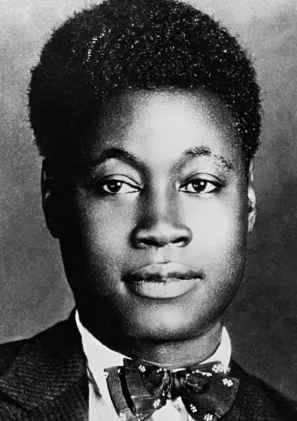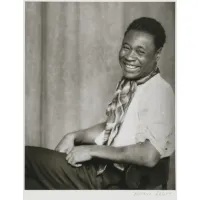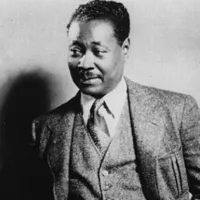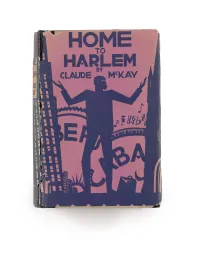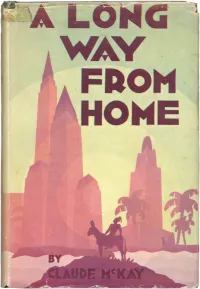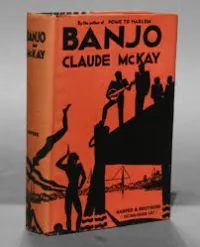Biography
1889 - 1948
“Human dignity is more precious than prestige.”
– Claude McKay
Festus Claudius “Claude” McKay was born in Jamaica, on September 15, 1890. As a young man he studied poetry and philosophy with Walter Jekyll, who encouraged him to write his poetry in his native Jamaican dialect. His first two books of verse were published in 1912. That same year, inspired by Booker T. Washington, McKay moved to the U.S. to study agronomy. It was there that he encountered racism for the first time. In 1914, he moved to New York, settling in Harlem, where he delved into the clandestine gay scene. Enjoying a love life that included both male and female partners, he entered a brief, but unsuccessful, marriage. In 1917 McKay published his next poems, including the radical "To the White Fiends," a challenge to white oppressors and bigots. His work appeared in various periodicals, most notably in the leftist magazine The Liberator, which published his anthem of resistance "If We Must Die," threatening retaliation for racial prejudice and abuse. In 1922 McKay published Harlem Shadows, his fourth and most important collection. The volume assured McKay’s place as a key figure in the Harlem Renaissance. During this period he explored Communism and worked with the Universal Negro Improvement Association, writing several articles for that organization’s publication. From 1923-1934 McKay traveled in Europe and North Africa, and wrote the novels Banjo and Banana Bottom. Most notably, during this period he also wrote Home to Harlem, a novel containing an openly gay character and detailed descriptions of Harlem’s gay and lesbian club scene in the 1920s, including drag and gender bending. After this sojourn, McKay returned to Harlem and began working on A Long Way from Home (1937), a memoir describing his experiences as an oppressed minority, calling for an end to colonialism and segregation. In failing health, the lifelong agnostic embraced Catholicism and, in 1940, became a U.S. citizen. In 1944 he left New York and relocated to Chicago to work for the Catholic Youth Organization. McKay died of congestive heart failure there on May 22, 1948.
1889 - 1948
“Human dignity is more precious than prestige.”
– Claude McKay
Festus Claudius “Claude” McKay was born in Jamaica, on September 15, 1890. As a young man he studied poetry and philosophy with Walter Jekyll, who encouraged him to write his poetry in his native Jamaican dialect. His first two books of verse were published in 1912. That same year, inspired by Booker T. Washington, McKay moved to the U.S. to study agronomy. It was there that he encountered racism for the first time. In 1914, he moved to New York, settling in Harlem, where he delved into the clandestine gay scene. Enjoying a love life that included both male and female partners, he entered a brief, but unsuccessful, marriage. In 1917 McKay published his next poems, including the radical "To the White Fiends," a challenge to white oppressors and bigots. His work appeared in various periodicals, most notably in the leftist magazine The Liberator, which published his anthem of resistance "If We Must Die," threatening retaliation for racial prejudice and abuse. In 1922 McKay published Harlem Shadows, his fourth and most important collection. The volume assured McKay’s place as a key figure in the Harlem Renaissance. During this period he explored Communism and worked with the Universal Negro Improvement Association, writing several articles for that organization’s publication. From 1923-1934 McKay traveled in Europe and North Africa, and wrote the novels Banjo and Banana Bottom. Most notably, during this period he also wrote Home to Harlem, a novel containing an openly gay character and detailed descriptions of Harlem’s gay and lesbian club scene in the 1920s, including drag and gender bending. After this sojourn, McKay returned to Harlem and began working on A Long Way from Home (1937), a memoir describing his experiences as an oppressed minority, calling for an end to colonialism and segregation. In failing health, the lifelong agnostic embraced Catholicism and, in 1940, became a U.S. citizen. In 1944 he left New York and relocated to Chicago to work for the Catholic Youth Organization. McKay died of congestive heart failure there on May 22, 1948.
Demography
Demography
Gender Male
Sexual Orientation Bisexual
Gender Identity Cisgender
Ethnicity Black
Faith Construct Agnostic Catholic
Nations Affiliated Jamaica United States United Kingdom Russia Morocco
Era/Epoch Harlem Renaissance (1919-1929)
Field(s) of Contribution
Author
Journalism
Poet
Commemorations & Honors
Harmon Gold Award for Literature for Home to Harlem (1928)
Posthumous Order of Jamaica Award for Contributions to Literature (1977)
Posthumously Named Jamaica’s National Poet by the Government (1977)
McKay’s Poem If We Must Die Featured in Documentary Screened at the Smithsonian’s National Museum of African American History and Culture Opening Day Festivities (2016)
Demography
Gender Male
Sexual Orientation Bisexual
Gender Identity Cisgender
Ethnicity Black
Faith Construct Agnostic Catholic
Nations Affiliated Jamaica United States United Kingdom Russia Morocco
Era/Epoch Harlem Renaissance (1919-1929)
Field(s) of Contribution
Author
Journalism
Poet
Commemorations & Honors
Harmon Gold Award for Literature for Home to Harlem (1928)
Posthumous Order of Jamaica Award for Contributions to Literature (1977)
Posthumously Named Jamaica’s National Poet by the Government (1977)
McKay’s Poem If We Must Die Featured in Documentary Screened at the Smithsonian’s National Museum of African American History and Culture Opening Day Festivities (2016)
Resources
Resources
Cooper, Wayne F. Claude McKay: Rebel Sojourner in the Harlem Renaissance. Baton Rouge: Louisiana State University Press, 1987.
Holcomb, Gary. Claude McKay, Code Name Sasha: Queer Black Marxism and the Harlem Renaissance. Gainesville: University Press of Florida, 2007.
Smethurst, James. The African American Roots of Modernism: From Reconstruction to the Harlem Renaissance. Chapel Hill: University of North Carolina Press, 2011.
https://en.wikipedia.org/wiki/Claude_McKay
https://ubuntubiographyproject.com/2017/09/15/claude-mckay/
http://www.poetryfoundation.org/bio/claude-mckay
https://www.washingtonpost.com/archive/entertainment/books/1987/02/01/c…
Resources
Cooper, Wayne F. Claude McKay: Rebel Sojourner in the Harlem Renaissance. Baton Rouge: Louisiana State University Press, 1987.
Holcomb, Gary. Claude McKay, Code Name Sasha: Queer Black Marxism and the Harlem Renaissance. Gainesville: University Press of Florida, 2007.
Smethurst, James. The African American Roots of Modernism: From Reconstruction to the Harlem Renaissance. Chapel Hill: University of North Carolina Press, 2011.
https://en.wikipedia.org/wiki/Claude_McKay
https://ubuntubiographyproject.com/2017/09/15/claude-mckay/
http://www.poetryfoundation.org/bio/claude-mckay
https://www.washingtonpost.com/archive/entertainment/books/1987/02/01/c…
